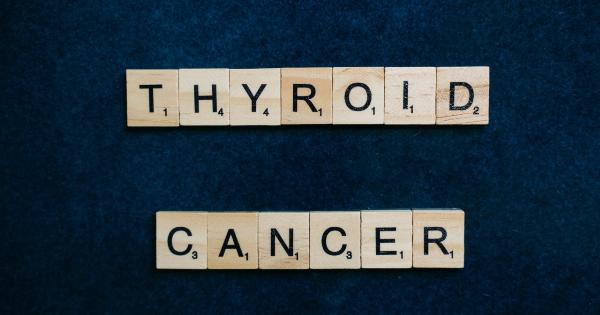Thyroid cancer is a type of cancer that affects the butterfly-shaped gland located in the front of the neck.
The thyroid gland produces hormones that regulate the body’s metabolism, but when this gland begins to grow abnormally, it can lead to thyroid cancer. In this article, we’ll be exploring the key takeaways you need to know about thyroid cancer so that you can understand more about this condition and how it can be treated.
1. Different Types of Thyroid Cancer
There are several types of thyroid cancer, including:.
- Papillary Thyroid Cancer
- Follicular Thyroid Cancer
- Medullary Thyroid Cancer
- Anaplastic Thyroid Cancer
Papillary thyroid cancer is the most common type of thyroid cancer, accounting for around 80% of cases. It tends to grow slowly and usually stays confined to the thyroid gland.
Follicular thyroid cancer is the second-most common type of thyroid cancer, accounting for up to 20% of cases. It also tends to grow slowly and can usually be treated successfully. Medullary thyroid cancer accounts for about 4% of cases and can be more aggressive, often requiring surgery and radiation therapy.
Anaplastic thyroid cancer is the rarest type of thyroid cancer and is the most aggressive and difficult to treat type.
2. Symptoms of Thyroid Cancer
Thyroid cancer often doesn’t cause any symptoms in its early stages. As it grows, signs and symptoms may include:.
- A lump in the neck
- Swollen lymph nodes in the neck
- Changes in voice or hoarseness
- Difficulty swallowing or breathing
- Neck or throat pain
Keep in mind that these symptoms can also be caused by other conditions, so it’s important to see a doctor if you experience any of these symptoms.
3. Diagnosis of Thyroid Cancer
Several tests can be done to diagnose thyroid cancer:.
- Physical examination – to check for lumps or swelling in the neck area
- Blood tests – to check thyroid hormone levels
- Ultrasound – to create an image of the thyroid gland and any nodules
- Biopsy – to remove a sample of tissue for examination under a microscope
4. Treatment of Thyroid Cancer
The treatment for thyroid cancer depends on the type and stage of the cancer. Treatment options include:.
- Surgery – to remove part or all of the thyroid gland
- Radiation therapy – to kill cancer cells with high-energy radiation beams
- Chemotherapy – to kill cancer cells with drugs
- Targeted drug therapy – to target specific genes or proteins in cancer cells
The goal of treatment is to remove all of the cancerous cells and to prevent the cancer from coming back. In some cases, treatment may not be necessary, but the doctor will need to monitor the patient regularly to watch for any changes.
5. Outlook for Thyroid Cancer
The outlook for thyroid cancer depends on several factors, including the type and stage of the cancer and the patient’s overall health.
Overall, the prognosis for thyroid cancer is usually good, with a 5-year survival rate of around 99% for early-stage papillary thyroid cancer. However, the prognosis can be poorer for more advanced or aggressive types of thyroid cancer.
If you have been diagnosed with thyroid cancer, it’s important to work closely with your doctor to determine the best treatment plan for your individual situation.
With early diagnosis and proper treatment, thyroid cancer can usually be successfully treated.



























